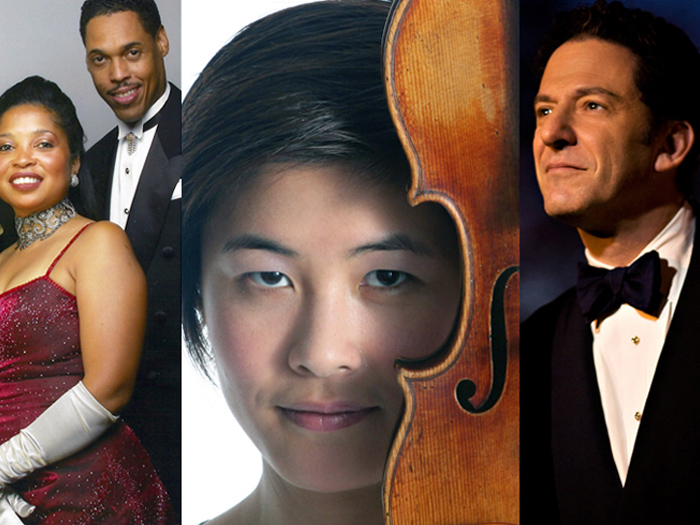The continued decline in the numbers of students majoring in humanities has some experts declaring the trend a crisis, but it could also reflect the success of the disciplines, a CSI professor said.
Want to flex your linguistic muscles? Participate in upcoming All Writers Welcome workshops – Oct. 30 and Nov. 13 at 2:30pm in 2S-217
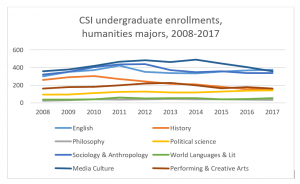
Undergrad humanities enrollments 2008-2017 at the College of Staten Island, based on fall semester figures for each year. Source: College of Staten Island Enrollment Services.
“In my own group of friends, there’s not another person who’s a humanities major,” said Judy Portalatin, an English major. “I think it’s because there’s this idea you can get more money and more job security with a non-humanities major.”
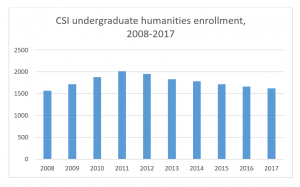
CSI undergraduate humanities enrollment, 2008-2017, based on fall semester enrollments for each year. Source: College of Staten Island Enrollment Services.
Portalatin said she became an English major because she loves to write, mainly non-fiction and poetry. She challenged the idea that her degree would limit her job opportunities.
“I don’t think people understand how many options we have, there’s so many things you can do,” Portalatin said. “I can go to law school, med school. I could become a teacher or an editor.”
“Honestly, I don’t care” if a humanities degree is not what the jobs market wants, said Peter Scasny, a History master’s student and recent recipient of a Fulbright award. “I don’t care what use it is, or rather what use people think it is, in the market because I love it. If you do what you love, opportunities will present themselves.”
Curious what the job opportunities are for humanities majors? Visit CSI’s Center for Career and Professional Development to get answers.
World Languages and Literatures Professor Gerry Milligan agreed.
“In my experience, it is not that there is a ‘crisis’ but rather quite a bit of misinformation about what a humanities degree can offer students,” Milligan, who is also director of CSI honors programs, wrote in an email. “A degree in Spanish or Italian, for example, offers students skills in written and oral communication (in English and in a second language) as well as critical thinking skills. Our students have had success being placed in Medical School, Pharmacy School, Physicians Assistant programs as well as in industry such as HR, marketing and sales.”
Anes Ahmed, an English sophomore, posited that the drop might reflect a lack of confidence in the skills required to succeed in humanities majors.
“The reason I got into English was because growing up I was always a story teller,” Ahmed said. “I feel like the main reason is more personal. Students really get distracted easily, through technology or other entertainment and because of that they don’t know how to express themselves or be creative.
“So they see the other majors and they think I’ll do that because I’m not strong in storytelling.”
“I’ve seen some students struggling with writing their papers because they didn’t have proper grammar or how to construct an argument,” Ahmed said. “You can be amazing but if you cannot articulate your ideas correctly that’s where it fails. I’ve seen master’s degree students, really intelligent people, who really struggle because they cannot write a paper.”
Beyond academic issues, the world at large may suffer, too, Portalatin said.
“People become very small-minded when they don’t want to educate themselves on the roots of our language or history in general,” Portalatin said. “These are vital to what has shaped us as a people. I think there’s a lack of understanding the importance of language and where we come from, and the importance of being able to properly articulate that.”
Media Culture Professor David Gerstner agreed.
“The failure to guide students through a well-rounded and critically engaged program of study leaves our students with very limited options,” Gerstner wrote in an email. “Recent research shows that a well-rounded and expansive liberal-arts college education remains in high demand by industry leaders.
“People who write well and think critically are more likely to offer innovative concepts,” Gerstner continued. “All industries look for these very talents when hiring.”
Whatever the reason for the precipitous drop nationally, Papa said no one should dismiss the value of studying the humanities: doing so develops core analytical and critical skills that, while they may seem impractical, have important applications across disciplines.
For example, business majors need to have good writing skills and it will serve them well to understand history and philosophy when they, say, analyze markets and consumer behavior.
At the same time, the decline in humanities majors does not mean the humanities are going unstudied or unappreciated, Papa said.
“We’ve had the business school come to us and say we want you to teach business writing,” Papa said.
“Those who believe majoring in English is not “practical” are mistaken,” said English Prof. Cate Marvin. “In fact, the previous Chancellor of CUNY, James B. McMiliken, was an English major. The combination of reading and writing skills one acquires alongside the broad cultural knowledge that the examination of literature provides, prepares individuals for any field they wish to enter.”
Papa agreed, saying studying the humanities may be more important than ever.
“It’s not that you’re necessarily going to go out there and become a writer, a political scientist or a historian,” he said. “We’ll teach you how to handle information and that will carry through to any career you may go into.
“We teach students how to deal with information – figuring out what’s useful and what’s not – and also how to express that and express that in a way that is intelligent, that is convincing, or creative.”
Caryl Watkins, Director of CSI’s Center for Career and Professional Development, said humanities majors are of interest to major employers.
“Liberal Arts and Humanities majors fare very well because of their ability to articulate their thoughts, think creatively and analytically, tend to be proficient writers, and are resilient and good problem solvers,” Watkins wrote in an email. “Other than very technical positions, Humanities and Liberal Arts majors do very well in the competitive job market. The key is knowing how to present themselves professionally, and of course, having an internship or two prior to graduation only increases a LA and Humanities marketability.”
Marvin, who will serve as mentor at an All Writers Workshop on Oct. 30, said that organizing the workshop reflected the department’s commitment to celebrating and cultivating language skills.
“We are offering these writing workshop for students who are interested in seeing what having their creative work critiqued is like,” Marvin said. “We hope they’ll learn ways to strengthen their writing, become acquainted with our creative writing professors, and consider taking classes with us, including poetry, fiction, creative nonfiction and play writing.
“We have one of the strongest creative writing programs in the country,” Marvin continued. “All of our writing professors have received national awards for their work; they also share the distinction of being dedicated teachers.”
Portalatin said however it might affect her job prospects, majoring in English was entirely fulfilling.
“I think (all my friends) know I have the most fun out of all of them,” she said. “They’ll say, ‘I have a four-hour calculus exam I have to study for and I’ll say, ‘Hmmm too bad… I’m writing a book of poetry.’”
Humanities majors can take heart: A major study from the American Academy of Arts and Sciences says the majority of humanities majors are happy and gainfully employed.

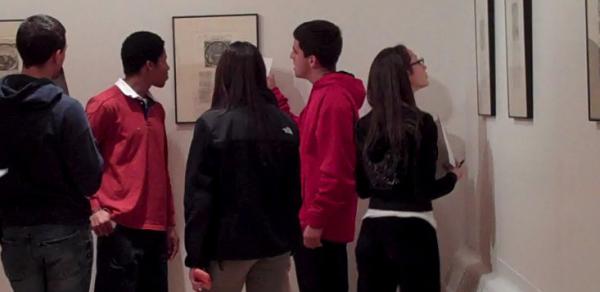
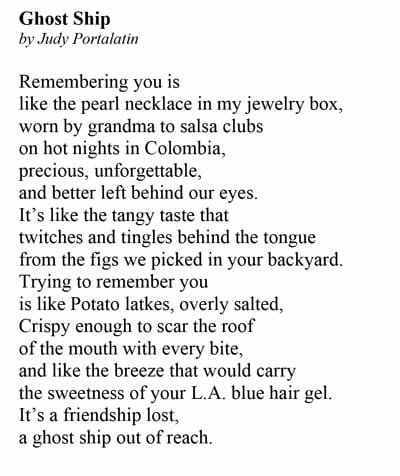
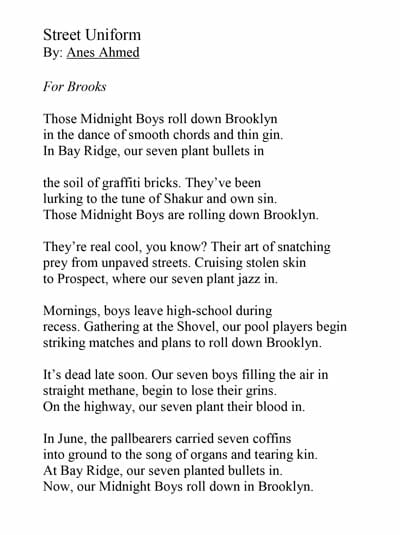
![[video] Dr. Fritz interviewed by NY1’s Anthony Pascale](https://csitoday.com/wp-content/uploads/2013/11/WJF-Anthony-Pascale-NY1.gif)
